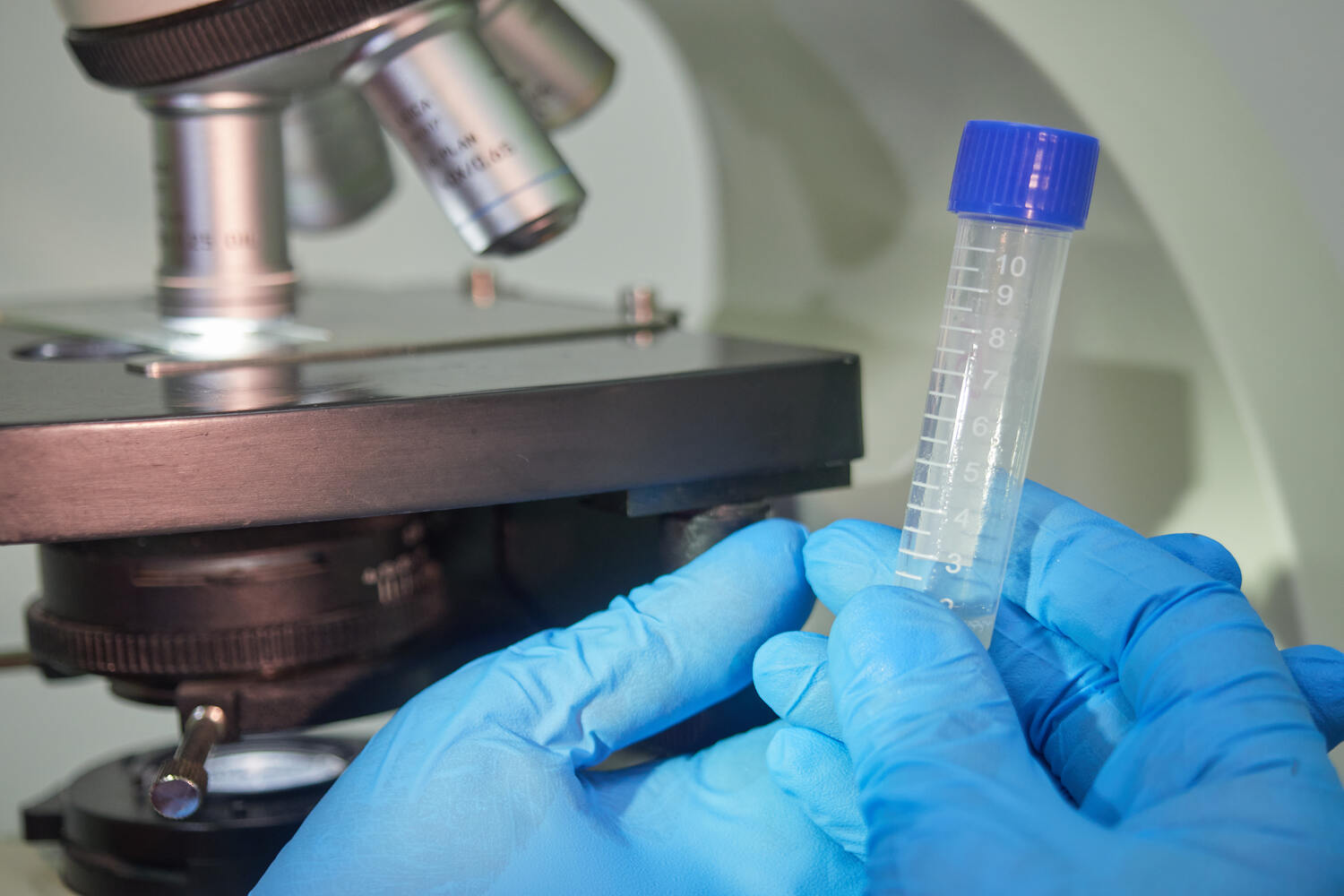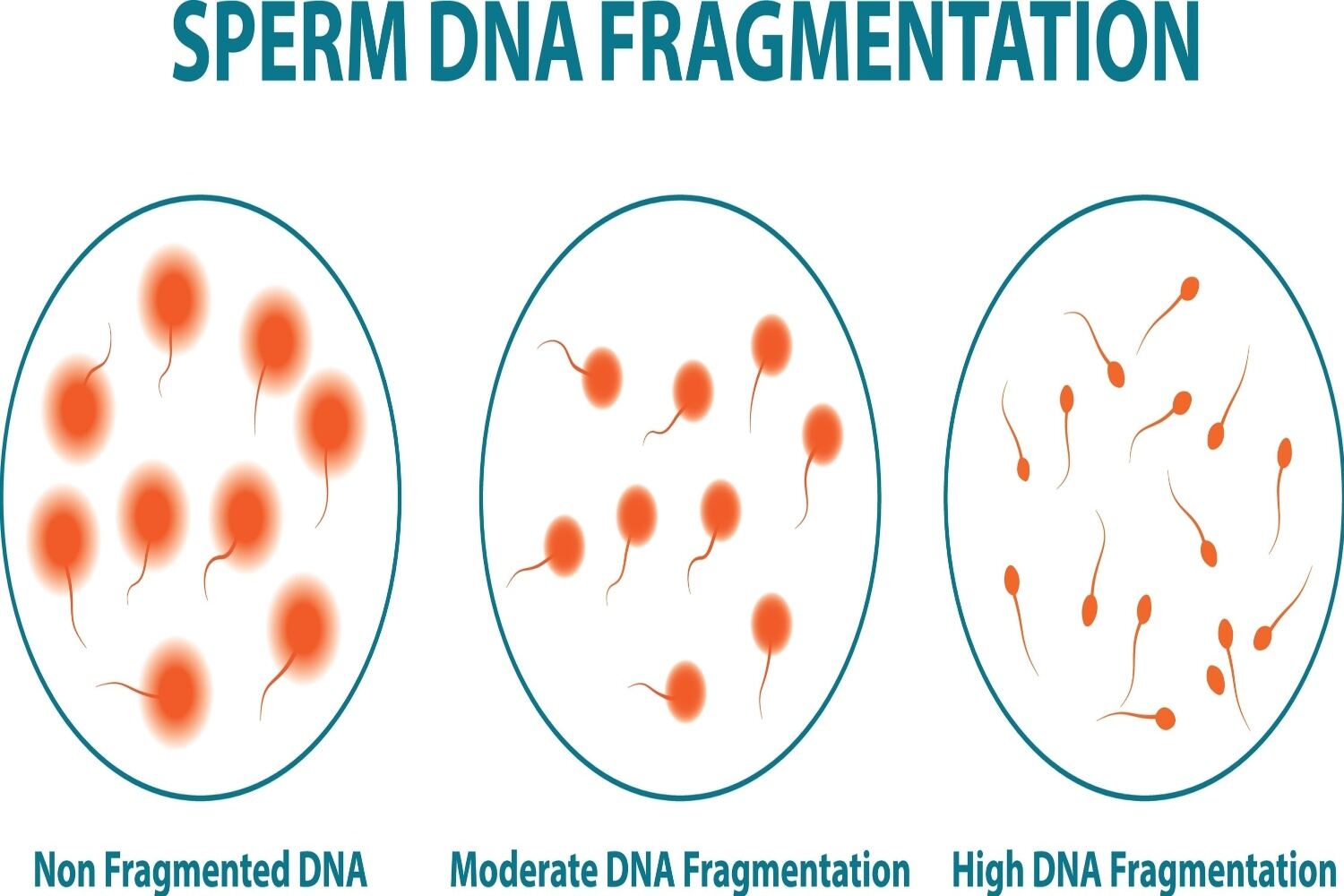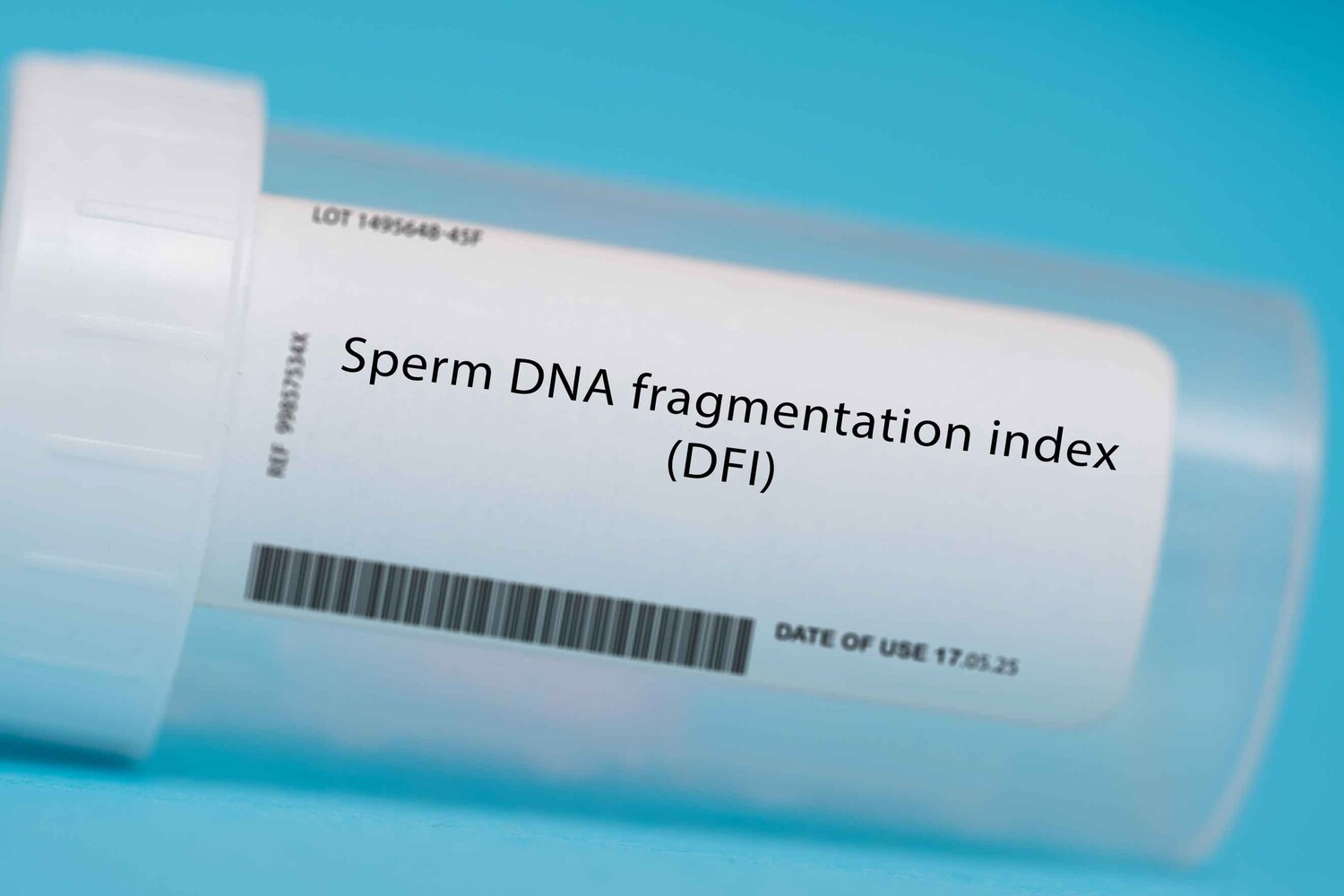
- What is DNA Fragmentation?
- How Does DNA Fragmentation Relate to Male Infertility?
- How is DNA Fragmentation Measured in Sperm?
- Steps Couples Take After Receiving DNA Fragmentation Results
- FAQ’s
What is DNA Fragmentation?
DNA fragmentation refers to the presence of breaks or damage in the DNA strands of sperm cells. In the context of male infertility, elevated levels of DNA fragmentation can have implications for fertility and reproductive outcomes (1).
How Does DNA Fragmentation Relate to Male Infertility?

Here’s a detailed explanation of DNA fragmentation and its relation to male infertility.
1. DNA in Sperm
Each sperm cell contains genetic material in the form of DNA, which carries the instructions necessary for fertilization and the development of a healthy embryo (2).
2. Importance of DNA Integrity
3. Causes of DNA Fragmentation
4. Measurement of DNA Fragmentation
DNA fragmentation is typically assessed through laboratory tests, with the sperm DNA fragmentation test being a common method. The percentage of sperm with damaged DNA is determined by this test (4).
5. Impact on Natural Conception
6. Effect on Assisted Reproductive Technologies (ART)
7. Potential Interventions
Depending on the underlying causes of DNA fragmentation, interventions may be considered to improve sperm DNA integrity. These interventions could include lifestyle modifications, antioxidant therapy, and addressing specific factors contributing to DNA damage (6A).
8. Risk of Pregnancy Complications
Elevated DNA fragmentation has been linked to an increased risk of pregnancy complications, including miscarriage (5A). Understanding the impact of DNA fragmentation is crucial for managing expectations and making informed decisions during the fertility journey.
9. Comprehensive Fertility Evaluation
Male infertility is often multifactorial, and DNA fragmentation is just one aspect of the overall assessment. A comprehensive fertility evaluation, considering other sperm parameters and female factors, is essential for developing an effective treatment plan.
Couples experiencing challenges with conception, especially when male infertility is a concern, may undergo testing for DNA fragmentation to assess the potential impact on fertility and guide appropriate interventions. Consulting with a reproductive specialist allows for a personalized approach to address specific fertility issues and optimize the chances of achieving a successful pregnancy.
How is DNA Fragmentation Measured in Sperm?
DNA fragmentation in sperm is measured through specialized laboratory tests designed to assess the integrity of the DNA strands within sperm cells. One common method for measuring DNA fragmentation is the sperm DNA fragmentation test (4A). Here’s an overview of how DNA fragmentation is measured in sperm
a. Sperm DNA Fragmentation Test
The sperm DNA fragmentation test is a laboratory assay that evaluates the extent of breaks or damage in the DNA strands of sperm. It provides a quantitative measure of the percentage of sperm with fragmented DNA.
b. Sample Collection
A sperm sample is collected from the male partner through masturbation into a sterile container. It’s important to follow the specific instructions provided by the healthcare provider or laboratory to ensure accurate results.
c. Processing of the Sample
The sperm sample is processed in the laboratory to isolate the sperm cells from seminal fluid. This separation is crucial for the accurate analysis of sperm DNA integrity.
d. Staining or Labeling
The isolated sperm cells are often treated with a fluorescent dye or labeled with specific markers that bind to DNA. This staining allows for the visualization of DNA breaks under a microscope.
e. Flow Cytometry or Microscopy
The stained sperm sample is then analyzed using specialized techniques such as flow cytometry(7) or fluorescence microscopy (8).These methods allow for the identification and quantification of sperm with intact DNA and those with fragmented DNA.
f. Assessment of DNA Integrity
By examining the fluorescent signals emitted by the stained sperm, the laboratory can distinguish between sperm with intact DNA and those with breaks or abnormalities. The percentage of sperm with DNA fragmentation is calculated based on the total sperm population.
g. Reporting Results
The results of the sperm DNA fragmentation test are typically reported as a percentage of DNA fragmentation. A higher percentage indicates a greater proportion of sperm with damaged DNA.
h. Interpretation of Results
i. Clinical Considerations
The results of the DNA fragmentation test are considered in the context of the individual’s overall fertility profile. A comprehensive assessment, including other sperm parameters and potential contributing factors, is essential for guiding further evaluation and treatment.
Steps Couples Take After Receiving DNA Fragmentation Results

Receiving DNA fragmentation results can be a significant moment for couples facing fertility challenges. Depending on the findings, there are several steps couples can take to address elevated DNA fragmentation and optimize their chances of achieving a successful pregnancy. Here are some recommended steps.
1. Consult With a Reproductive Specialist
Schedule a follow-up appointment with a reproductive endocrinologist or fertility specialist to discuss the DNA fragmentation results in detail. The specialist can provide insights into the implications of the findings and guide the couple through potential next steps.
2. Comprehensive Fertility Evaluation
Understand that DNA fragmentation is just one aspect of male fertility. The specialist may recommend a comprehensive evaluation, including a thorough analysis of other sperm parameters, hormone levels, and any potential underlying factors contributing to infertility.
3. Evaluate Lifestyle Factors
Assess and modify lifestyle factors that may contribute to DNA fragmentation. This could include addressing habits such as smoking, excessive alcohol consumption, or exposure to environmental toxins. Adopting a healthy lifestyle may positively impact sperm health.
4. Consider Antioxidant Supplementation
Antioxidants, such as vitamins C and E, have been suggested to reduce oxidative stress and potentially improve sperm DNA integrity. The specialist may recommend specific antioxidant supplements based on individual needs.
5. Discuss Treatment Options
Depending on the severity of DNA fragmentation and overall fertility factors, the specialist may discuss potential treatment options. These may include lifestyle modifications, antioxidant therapy, or advanced reproductive technologies such as in vitro fertilization (IVF) with intracytoplasmic sperm injection (ICSI).
6. Explore Reproductive Technologies
If natural conception is challenging due to high DNA fragmentation, the specialist may discuss the option of assisted reproductive technologies (ART) like IVF and ICSI. ICSI involves injecting a single sperm directly into an egg, potentially bypassing some of the challenges associated with DNA fragmentation.
7. Consider Pre-implantation Genetic Testing (PGT)
In cases of recurrent pregnancy loss or severe male factor infertility, the specialist may discuss the option of preimplantation genetic testing (PGT) for embryos (9). PGT can help identify embryos with normal DNA integrity before implantation.
8. Attend Counseling And Support Services
The emotional aspect of dealing with fertility challenges, especially when faced with DNA fragmentation results, can be significant. Couples may benefit from attending counseling or support services to navigate the emotional and psychological aspects of their fertility journey.
9. Follow-Up Testing
Depending on the treatment plan, the specialist may recommend follow-up testing to monitor changes in DNA fragmentation over time. This can help assess the effectiveness of interventions and guide adjustments to the treatment approach.
10. Educate and Advocate for Yourself
Stay informed about fertility options, ask questions, and actively participate in the decision-making process. Being proactive in seeking information and advocating for your needs can contribute to a more empowered fertility journey.
FAQ’s
1. Can You Still Get Pregnant With DNA Fragmentation?
Yes, it is possible to conceive with DNA fragmentation. For cases of mild defragmentation, natural conception may be possible. If the fragmentation is more than 30%, you may need to consult with a fertility specialist for treatment options such as IVF to be able to conceive. By following treatment protocol and lifestyle changes, conception may be possible.
2. How do You Fix DNA Fragmentation in Sperm?
You will need to consult a fertility specialist who will do a comprehensive evaluation. The doctor may recommend a series of tests to evaluate the extent of fragmentation and suggest treatment options accordingly. This will be a combination of lifestyle changes, medications, antioxidant therapies and artificial reproductive technologies such as IUI and IVF.
References
- Full article: Sperm DNA fragmentation in male infertility: From bench to bedside (tandfonline.com)
- Sperm DNA damage assessment: a test whose time has come – ScienceDirect
- Sperm DNA Fragmentation: A New Guideline for Clinicians – PMC (nih.gov)
- Sperm DNA fragmentation testing: Summary evidence and clinical practice recommendations – PMC (nih.gov)
- Sperm DNA Fragmentation in Reproductive Medicine: A Review – PMC (nih.gov)
- What should be done for men with sperm DNA fragmentation? – PMC (nih.gov)
- Flow Cytometry: An Overview – PMC (nih.gov)
- Fluorescence Microscopy—An Outline of Hardware, Biological Handling, and Fluorophore Considerations – PMC (nih.gov)
- Preimplantation Genetic Testing (PGT) | Fertility & Reproductive Medicine Center | Washington University in St. Louis (wustl.edu)


